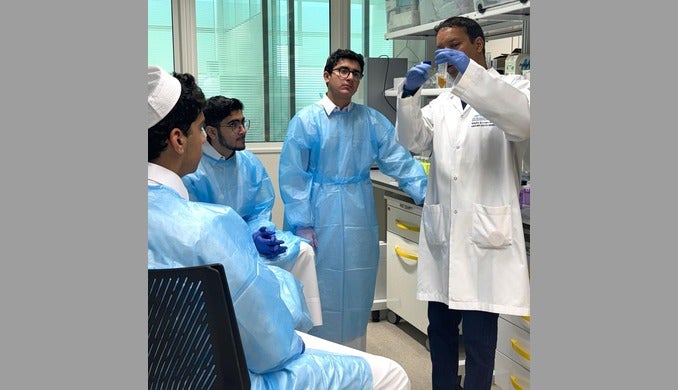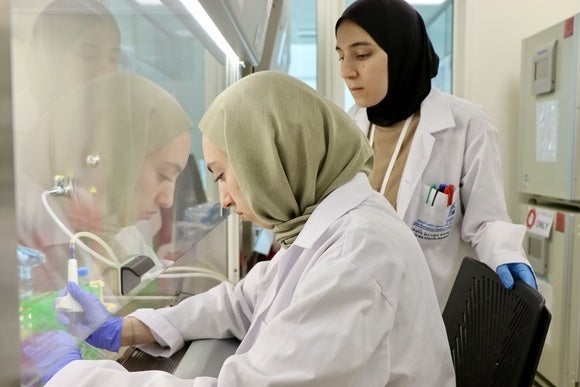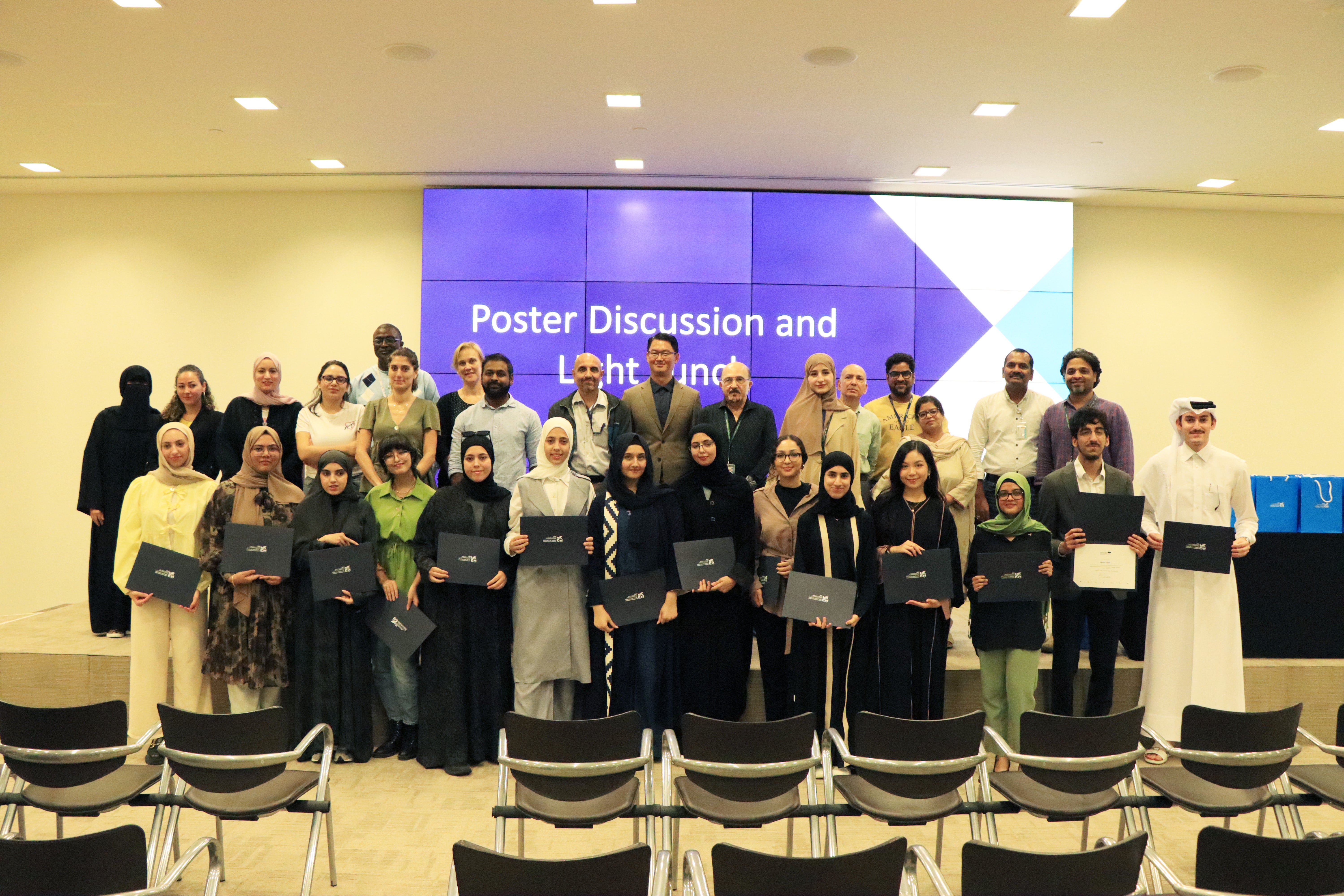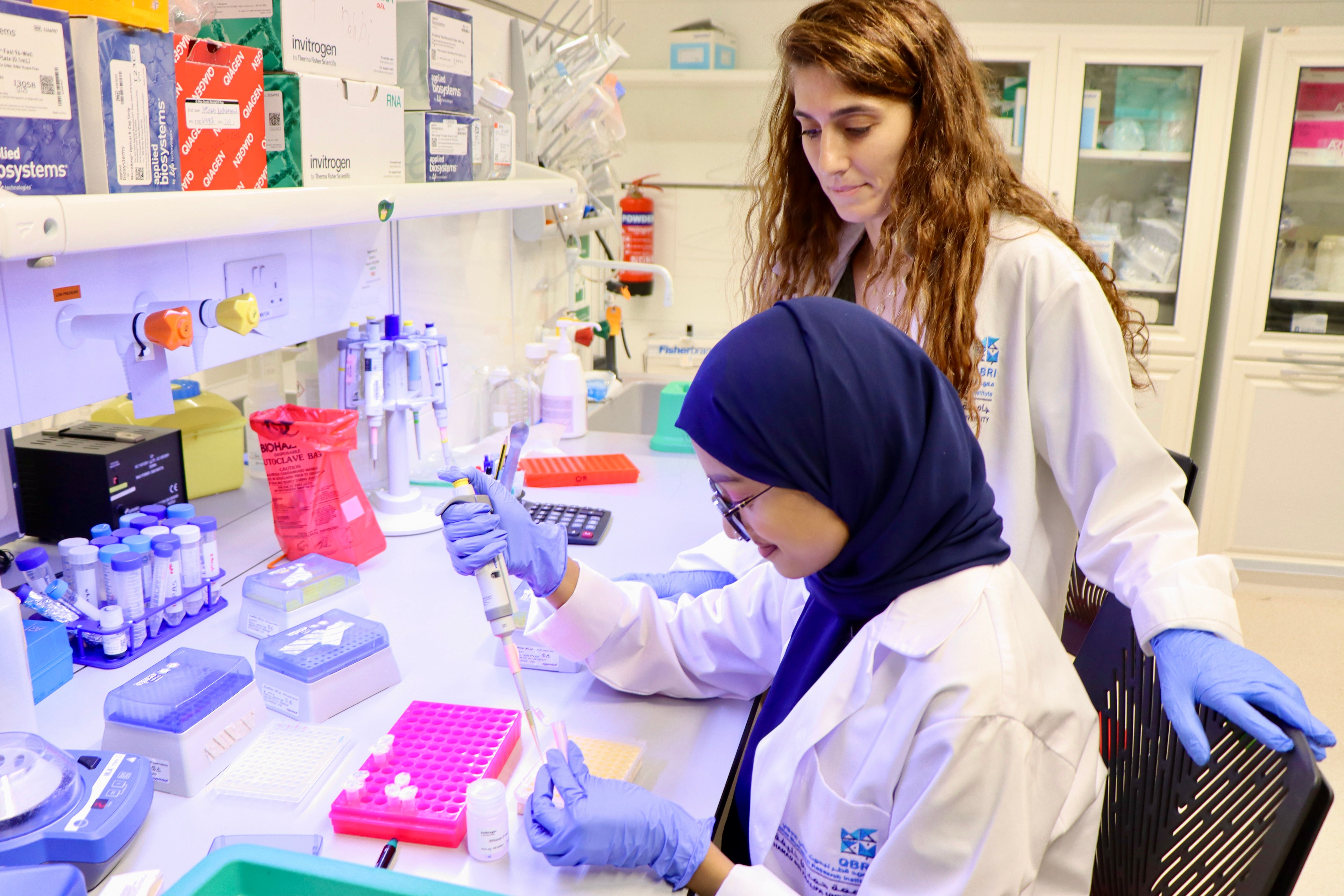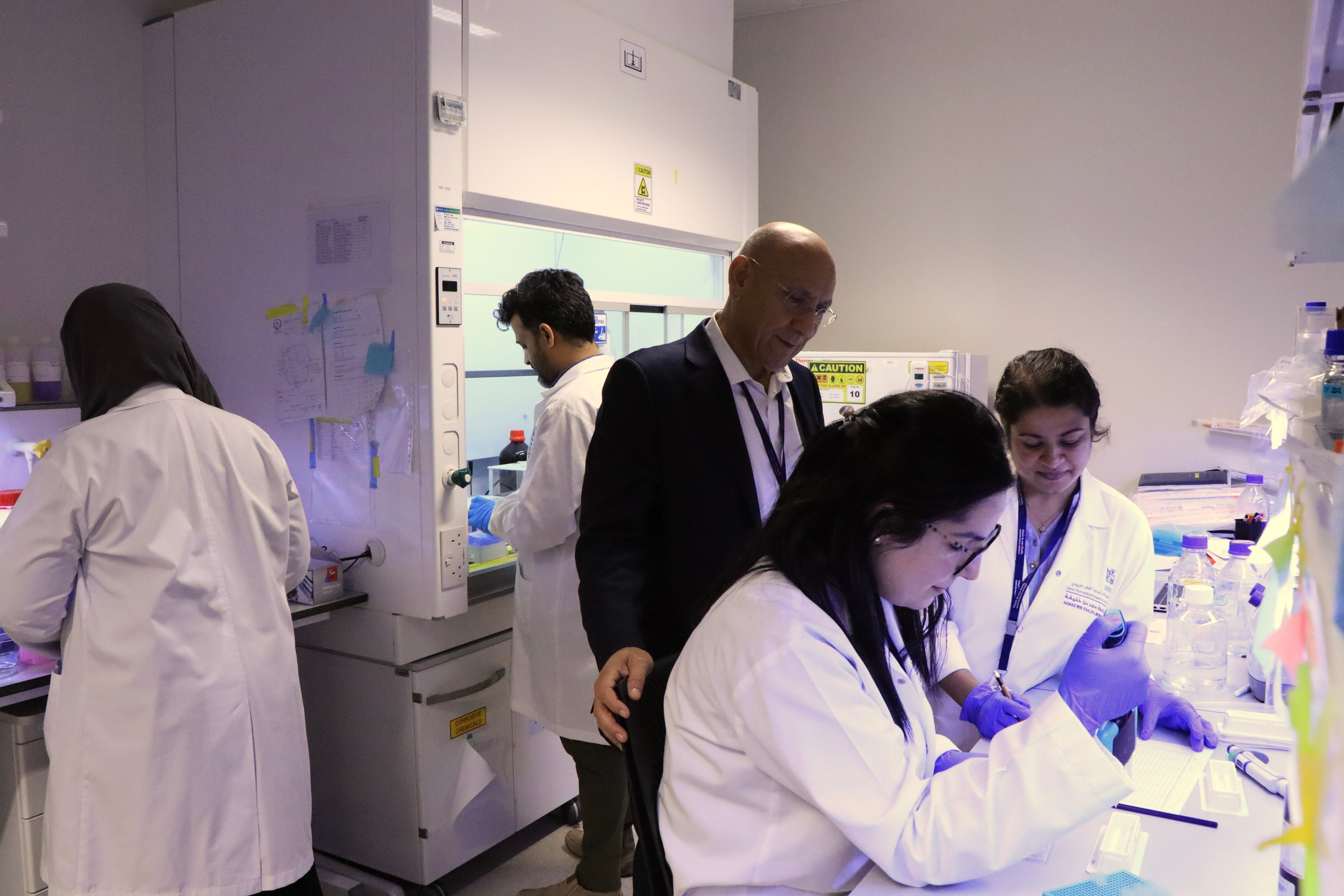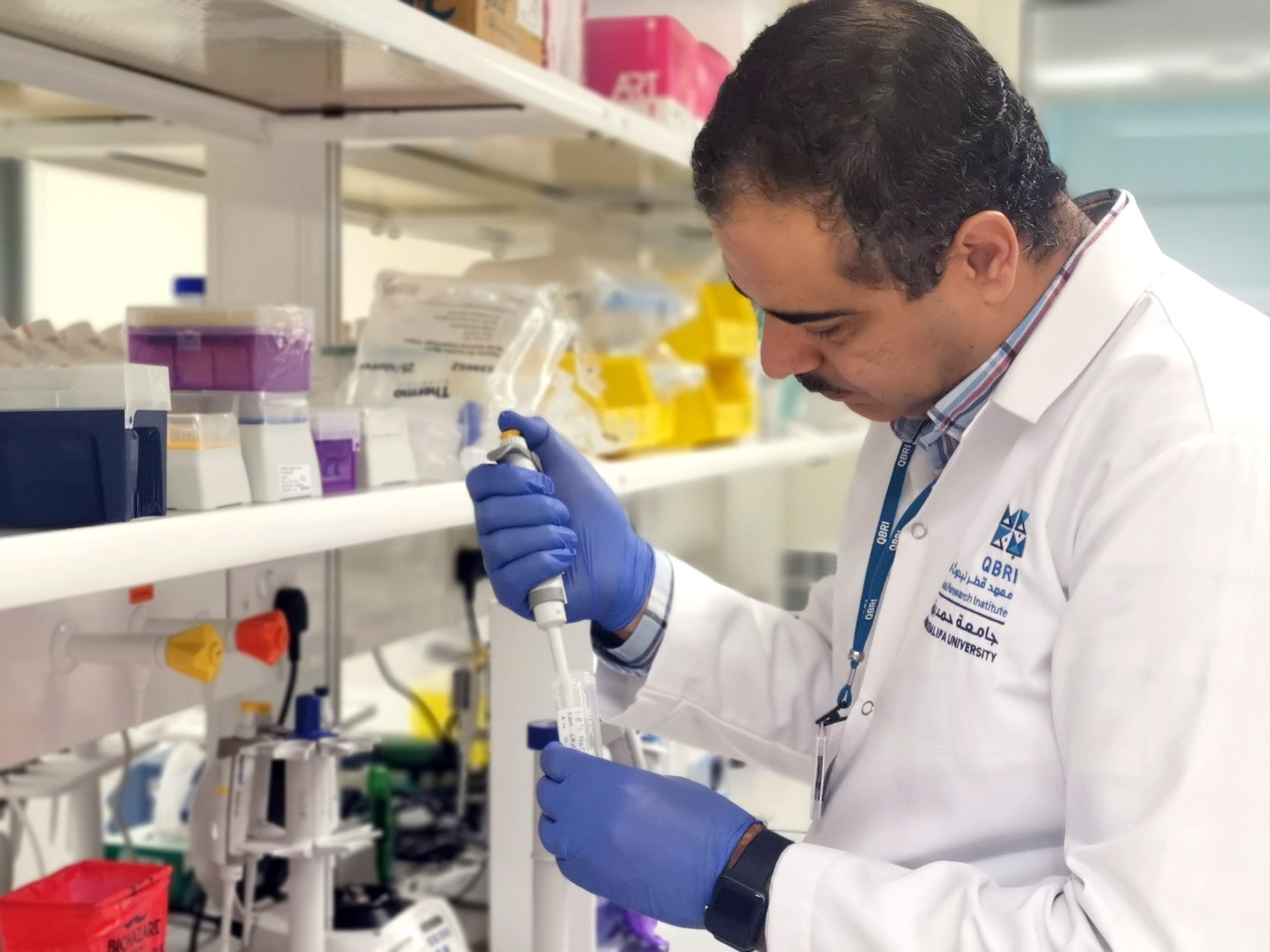
HBKU’s Qatar Biomedical Research Institute Releases Findings of Pioneering Autism Study
Results of groundbreaking study provides crucial data for adequate healthcare planning

Qatar Biomedical Research Institute (QBRI), part of Hamad Bin Khalifa University (HBKU), has released the results of its intensive six-year study on the Prevalence of Autism Spectrum Disorder in Qatar – the first of its kind to be conducted in Qatar and the Gulf region.
The study was carried out by QBRI’s Neurological Disorders Research Center (NDRC), which focuses on investigating the increasing prevalence of neurological disorders in Qatar and the region, including conditions such as Autism Spectrum Disorder (ASD).
Dr. Fouad Al-Shaban, a senior scientist at NDRC, QBRI, spearheaded the unprecedented research study, which aimed to estimate the prevalence of ASD among Qatari families and other families residing in Qatar, and establish an autism database and disease registry. The database was developed to provide descriptive data on the classification and phenotyping of the population of children diagnosed with ASD to assess the effect of certain risk factors on the prevalence rate.
Outcomes of the two-phase study revealed the prevalence of ASD in Qatar to be 1.14 percent or 1 in 87 children; 1 in 56 boys and one in 230 girls. From the results, and based on the 2016 census, the study estimates that approximately 4,791 individuals in Qatar between the ages of 1 and 20 years have ASD. The results of the study were recently published in the internationally-acclaimed journal on child & adolescent psychology and psychiatry, Journal of Child Psychology and Psychiatry, the official journal of the UK-based Association for Child and Adolescent Mental Health.
Dr. Al-Shaban, said: “The study is the first of its kind that set about to determine the prevalence of autism in Qatar and the region. We are proud to make the findings available to the international medical community, and it is our hope that the outcomes will be used to inform future studies on autism.
Phase 1 of the study involved the screening of 9074 primary school students aged 5 to 12 years from 93 public and private schools by using the Social Communication Questionnaire screening tool after translation and validation to the Arabic language. Phase 2 extended the study to include hospitals and special needs centers offering services to individuals with ASD, such as Rumailah Hospital and Al Shafallah Center for Persons with Disabilities, the two primary government centers engaged in the study. Both phases reflect similar prevalence rates of approximately 1.146%.
In addition, although the consanguinity rate is around 52% across the GCC and Middle East, our findings don’t show a significant correlation between consanguinity and the prevalence rate of ASD in Qatar; which is supported by the fact that ASD is a multi-genetic disorder with no direct causal link to consanguinity. Meanwhile, the study found that consanguinity is related to the severity of ASD.”
Dr. Omar El-Agnaf, executive director, QBRI, said: “We are extremely proud of the efforts of all those who have supported QBRI from the outset of the study. The generous support received from Qatar National Research Fund set the ball in motion and made this unprecedented study possible. The success and findings of this study is testament to what can be achieved through a collective vision to spearhead research that will pave the way for advancements in healthcare.”
These findings have enabled researchers, in collaboration with the Ministry of Public Health, to create and complete Qatar’s first autism registry using the data of 1,300 individuals with ASD, which will be made available to researchers with a particular interest in neurological disorders.
The results of the study also provide crucial data that will enable the country and its policymakers to work towards adequate healthcare planning and make provisions for specialized healthcare centers, and the necessary capacity building for individuals with autism.
The study was conducted in collaboration with national and international partners, including Hamad Medical Corporation, Al Shafallah Center for Persons with Disabilities, Qatar University, Cleveland Clinic, U.S.A., and Oregon Health and Science University, U.S.A.
Her Excellency - Amal Bint Abdullatif Al Mannai, Chief Executive Officer of Qatar Foundation for Social Work, said: “It was an honor for Al Shafallah to be able to participate in the groundbreaking study, providing researchers from QBRI with access to invaluable data to drive the study. The screening done has revealed fascinating insights that will make tremendous contributions to the future provisions of adequate healthcare for those with autism and other neurological disorders.”
Dr. Saleh Bin Ali Al-Marri, assistant minister of health for health affairs at the Ministry of Public Health, said: “We thank all those individuals and organizations who worked tirelessly on this study. The findings of the study will provide valuable data, which will help us develop a personalized and sustainable healthcare strategy to address the specific needs of those individuals with autism.”
QBRI is home to three research centers – Cancer Research Center, Diabetes Research Center, and the Neurological Disorders Research Center. QBRI was founded with the objective of leading pioneering national research to transform healthcare through innovation in prevention, diagnosis, and treatment of diseases affecting the Qatari population and the region.
Related News

QBRI Partners with PHCC and QCRI to Combat Prediabetes Through New Screening Tool

QBRI and Sultan Qaboos University Collaborate on Autism Spectrum Disorder Research

HBKU's QBRI Unveils Promising Arabic Stimuli: A Step Forward in Autism Spectrum Disorder (ASD) Diagnosis

Unveiling New Insights into Dementia: Autoantibodies and Blood-Based Biomarkers

Embracing the Colors of the Autism Spectrum: The Importance of Early Intervention and Advocacy

Recent research on the health impact of highly processed foods and drinks and the risk of obesity and diabetes

QBRI Partners with PHCC and QCRI to Combat Prediabetes Through New Screening Tool

QBRI and Sultan Qaboos University Collaborate on Autism Spectrum Disorder Research

HBKU's QBRI Unveils Promising Arabic Stimuli: A Step Forward in Autism Spectrum Disorder (ASD) Diagnosis

Unveiling New Insights into Dementia: Autoantibodies and Blood-Based Biomarkers

Embracing the Colors of the Autism Spectrum: The Importance of Early Intervention and Advocacy

Recent research on the health impact of highly processed foods and drinks and the risk of obesity and diabetes

QBRI Partners with PHCC and QCRI to Combat Prediabetes Through New Screening Tool

QBRI and Sultan Qaboos University Collaborate on Autism Spectrum Disorder Research

HBKU's QBRI Unveils Promising Arabic Stimuli: A Step Forward in Autism Spectrum Disorder (ASD) Diagnosis

Unveiling New Insights into Dementia: Autoantibodies and Blood-Based Biomarkers

Embracing the Colors of the Autism Spectrum: The Importance of Early Intervention and Advocacy

Recent research on the health impact of highly processed foods and drinks and the risk of obesity and diabetes

QBRI Partners with PHCC and QCRI to Combat Prediabetes Through New Screening Tool

QBRI and Sultan Qaboos University Collaborate on Autism Spectrum Disorder Research

HBKU's QBRI Unveils Promising Arabic Stimuli: A Step Forward in Autism Spectrum Disorder (ASD) Diagnosis

Unveiling New Insights into Dementia: Autoantibodies and Blood-Based Biomarkers

Embracing the Colors of the Autism Spectrum: The Importance of Early Intervention and Advocacy

Recent research on the health impact of highly processed foods and drinks and the risk of obesity and diabetes

QBRI Partners with PHCC and QCRI to Combat Prediabetes Through New Screening Tool

QBRI and Sultan Qaboos University Collaborate on Autism Spectrum Disorder Research

HBKU's QBRI Unveils Promising Arabic Stimuli: A Step Forward in Autism Spectrum Disorder (ASD) Diagnosis

Unveiling New Insights into Dementia: Autoantibodies and Blood-Based Biomarkers

Embracing the Colors of the Autism Spectrum: The Importance of Early Intervention and Advocacy

Recent research on the health impact of highly processed foods and drinks and the risk of obesity and diabetes

QBRI Partners with PHCC and QCRI to Combat Prediabetes Through New Screening Tool

QBRI and Sultan Qaboos University Collaborate on Autism Spectrum Disorder Research

HBKU's QBRI Unveils Promising Arabic Stimuli: A Step Forward in Autism Spectrum Disorder (ASD) Diagnosis

Unveiling New Insights into Dementia: Autoantibodies and Blood-Based Biomarkers

Embracing the Colors of the Autism Spectrum: The Importance of Early Intervention and Advocacy

Recent research on the health impact of highly processed foods and drinks and the risk of obesity and diabetes

QBRI Partners with PHCC and QCRI to Combat Prediabetes Through New Screening Tool

QBRI and Sultan Qaboos University Collaborate on Autism Spectrum Disorder Research

HBKU's QBRI Unveils Promising Arabic Stimuli: A Step Forward in Autism Spectrum Disorder (ASD) Diagnosis

Unveiling New Insights into Dementia: Autoantibodies and Blood-Based Biomarkers

Embracing the Colors of the Autism Spectrum: The Importance of Early Intervention and Advocacy

Recent research on the health impact of highly processed foods and drinks and the risk of obesity and diabetes

QBRI Partners with PHCC and QCRI to Combat Prediabetes Through New Screening Tool

QBRI and Sultan Qaboos University Collaborate on Autism Spectrum Disorder Research

HBKU's QBRI Unveils Promising Arabic Stimuli: A Step Forward in Autism Spectrum Disorder (ASD) Diagnosis

Unveiling New Insights into Dementia: Autoantibodies and Blood-Based Biomarkers

Embracing the Colors of the Autism Spectrum: The Importance of Early Intervention and Advocacy

Recent research on the health impact of highly processed foods and drinks and the risk of obesity and diabetes

QBRI Partners with PHCC and QCRI to Combat Prediabetes Through New Screening Tool

QBRI and Sultan Qaboos University Collaborate on Autism Spectrum Disorder Research

HBKU's QBRI Unveils Promising Arabic Stimuli: A Step Forward in Autism Spectrum Disorder (ASD) Diagnosis

Unveiling New Insights into Dementia: Autoantibodies and Blood-Based Biomarkers

Embracing the Colors of the Autism Spectrum: The Importance of Early Intervention and Advocacy

Recent research on the health impact of highly processed foods and drinks and the risk of obesity and diabetes

QBRI Partners with PHCC and QCRI to Combat Prediabetes Through New Screening Tool

QBRI and Sultan Qaboos University Collaborate on Autism Spectrum Disorder Research

HBKU's QBRI Unveils Promising Arabic Stimuli: A Step Forward in Autism Spectrum Disorder (ASD) Diagnosis

Unveiling New Insights into Dementia: Autoantibodies and Blood-Based Biomarkers

Embracing the Colors of the Autism Spectrum: The Importance of Early Intervention and Advocacy

Recent research on the health impact of highly processed foods and drinks and the risk of obesity and diabetes

QBRI Partners with PHCC and QCRI to Combat Prediabetes Through New Screening Tool

QBRI and Sultan Qaboos University Collaborate on Autism Spectrum Disorder Research

HBKU's QBRI Unveils Promising Arabic Stimuli: A Step Forward in Autism Spectrum Disorder (ASD) Diagnosis

Unveiling New Insights into Dementia: Autoantibodies and Blood-Based Biomarkers

Embracing the Colors of the Autism Spectrum: The Importance of Early Intervention and Advocacy

Recent research on the health impact of highly processed foods and drinks and the risk of obesity and diabetes

QBRI Partners with PHCC and QCRI to Combat Prediabetes Through New Screening Tool

QBRI and Sultan Qaboos University Collaborate on Autism Spectrum Disorder Research

HBKU's QBRI Unveils Promising Arabic Stimuli: A Step Forward in Autism Spectrum Disorder (ASD) Diagnosis

Unveiling New Insights into Dementia: Autoantibodies and Blood-Based Biomarkers

Embracing the Colors of the Autism Spectrum: The Importance of Early Intervention and Advocacy

Recent research on the health impact of highly processed foods and drinks and the risk of obesity and diabetes

QBRI Partners with PHCC and QCRI to Combat Prediabetes Through New Screening Tool

QBRI and Sultan Qaboos University Collaborate on Autism Spectrum Disorder Research

HBKU's QBRI Unveils Promising Arabic Stimuli: A Step Forward in Autism Spectrum Disorder (ASD) Diagnosis

Unveiling New Insights into Dementia: Autoantibodies and Blood-Based Biomarkers

Embracing the Colors of the Autism Spectrum: The Importance of Early Intervention and Advocacy

Recent research on the health impact of highly processed foods and drinks and the risk of obesity and diabetes

QBRI Partners with PHCC and QCRI to Combat Prediabetes Through New Screening Tool

QBRI and Sultan Qaboos University Collaborate on Autism Spectrum Disorder Research

HBKU's QBRI Unveils Promising Arabic Stimuli: A Step Forward in Autism Spectrum Disorder (ASD) Diagnosis

Unveiling New Insights into Dementia: Autoantibodies and Blood-Based Biomarkers

Embracing the Colors of the Autism Spectrum: The Importance of Early Intervention and Advocacy

Recent research on the health impact of highly processed foods and drinks and the risk of obesity and diabetes

QBRI Partners with PHCC and QCRI to Combat Prediabetes Through New Screening Tool

QBRI and Sultan Qaboos University Collaborate on Autism Spectrum Disorder Research

HBKU's QBRI Unveils Promising Arabic Stimuli: A Step Forward in Autism Spectrum Disorder (ASD) Diagnosis

Unveiling New Insights into Dementia: Autoantibodies and Blood-Based Biomarkers

Embracing the Colors of the Autism Spectrum: The Importance of Early Intervention and Advocacy

Recent research on the health impact of highly processed foods and drinks and the risk of obesity and diabetes

QBRI Partners with PHCC and QCRI to Combat Prediabetes Through New Screening Tool

QBRI and Sultan Qaboos University Collaborate on Autism Spectrum Disorder Research

HBKU's QBRI Unveils Promising Arabic Stimuli: A Step Forward in Autism Spectrum Disorder (ASD) Diagnosis

Unveiling New Insights into Dementia: Autoantibodies and Blood-Based Biomarkers

Embracing the Colors of the Autism Spectrum: The Importance of Early Intervention and Advocacy

Recent research on the health impact of highly processed foods and drinks and the risk of obesity and diabetes

QBRI Partners with PHCC and QCRI to Combat Prediabetes Through New Screening Tool

QBRI and Sultan Qaboos University Collaborate on Autism Spectrum Disorder Research

HBKU's QBRI Unveils Promising Arabic Stimuli: A Step Forward in Autism Spectrum Disorder (ASD) Diagnosis

Unveiling New Insights into Dementia: Autoantibodies and Blood-Based Biomarkers

Embracing the Colors of the Autism Spectrum: The Importance of Early Intervention and Advocacy

Recent research on the health impact of highly processed foods and drinks and the risk of obesity and diabetes

QBRI Partners with PHCC and QCRI to Combat Prediabetes Through New Screening Tool

QBRI and Sultan Qaboos University Collaborate on Autism Spectrum Disorder Research

HBKU's QBRI Unveils Promising Arabic Stimuli: A Step Forward in Autism Spectrum Disorder (ASD) Diagnosis

Unveiling New Insights into Dementia: Autoantibodies and Blood-Based Biomarkers

Embracing the Colors of the Autism Spectrum: The Importance of Early Intervention and Advocacy

Recent research on the health impact of highly processed foods and drinks and the risk of obesity and diabetes

QBRI Partners with PHCC and QCRI to Combat Prediabetes Through New Screening Tool

QBRI and Sultan Qaboos University Collaborate on Autism Spectrum Disorder Research

HBKU's QBRI Unveils Promising Arabic Stimuli: A Step Forward in Autism Spectrum Disorder (ASD) Diagnosis

Unveiling New Insights into Dementia: Autoantibodies and Blood-Based Biomarkers

Embracing the Colors of the Autism Spectrum: The Importance of Early Intervention and Advocacy

Recent research on the health impact of highly processed foods and drinks and the risk of obesity and diabetes

QBRI Partners with PHCC and QCRI to Combat Prediabetes Through New Screening Tool

QBRI and Sultan Qaboos University Collaborate on Autism Spectrum Disorder Research

HBKU's QBRI Unveils Promising Arabic Stimuli: A Step Forward in Autism Spectrum Disorder (ASD) Diagnosis

Unveiling New Insights into Dementia: Autoantibodies and Blood-Based Biomarkers

Embracing the Colors of the Autism Spectrum: The Importance of Early Intervention and Advocacy

Recent research on the health impact of highly processed foods and drinks and the risk of obesity and diabetes

QBRI Partners with PHCC and QCRI to Combat Prediabetes Through New Screening Tool

QBRI and Sultan Qaboos University Collaborate on Autism Spectrum Disorder Research

HBKU's QBRI Unveils Promising Arabic Stimuli: A Step Forward in Autism Spectrum Disorder (ASD) Diagnosis

Unveiling New Insights into Dementia: Autoantibodies and Blood-Based Biomarkers

Embracing the Colors of the Autism Spectrum: The Importance of Early Intervention and Advocacy

Recent research on the health impact of highly processed foods and drinks and the risk of obesity and diabetes

QBRI Partners with PHCC and QCRI to Combat Prediabetes Through New Screening Tool

QBRI and Sultan Qaboos University Collaborate on Autism Spectrum Disorder Research

HBKU's QBRI Unveils Promising Arabic Stimuli: A Step Forward in Autism Spectrum Disorder (ASD) Diagnosis

Unveiling New Insights into Dementia: Autoantibodies and Blood-Based Biomarkers

Embracing the Colors of the Autism Spectrum: The Importance of Early Intervention and Advocacy

Recent research on the health impact of highly processed foods and drinks and the risk of obesity and diabetes

QBRI Partners with PHCC and QCRI to Combat Prediabetes Through New Screening Tool

QBRI and Sultan Qaboos University Collaborate on Autism Spectrum Disorder Research

HBKU's QBRI Unveils Promising Arabic Stimuli: A Step Forward in Autism Spectrum Disorder (ASD) Diagnosis

Unveiling New Insights into Dementia: Autoantibodies and Blood-Based Biomarkers

Embracing the Colors of the Autism Spectrum: The Importance of Early Intervention and Advocacy

Recent research on the health impact of highly processed foods and drinks and the risk of obesity and diabetes

QBRI Partners with PHCC and QCRI to Combat Prediabetes Through New Screening Tool

QBRI and Sultan Qaboos University Collaborate on Autism Spectrum Disorder Research

HBKU's QBRI Unveils Promising Arabic Stimuli: A Step Forward in Autism Spectrum Disorder (ASD) Diagnosis

Unveiling New Insights into Dementia: Autoantibodies and Blood-Based Biomarkers

Embracing the Colors of the Autism Spectrum: The Importance of Early Intervention and Advocacy

Recent research on the health impact of highly processed foods and drinks and the risk of obesity and diabetes

QBRI Partners with PHCC and QCRI to Combat Prediabetes Through New Screening Tool

QBRI and Sultan Qaboos University Collaborate on Autism Spectrum Disorder Research

HBKU's QBRI Unveils Promising Arabic Stimuli: A Step Forward in Autism Spectrum Disorder (ASD) Diagnosis

Unveiling New Insights into Dementia: Autoantibodies and Blood-Based Biomarkers

Embracing the Colors of the Autism Spectrum: The Importance of Early Intervention and Advocacy

Recent research on the health impact of highly processed foods and drinks and the risk of obesity and diabetes

QBRI Partners with PHCC and QCRI to Combat Prediabetes Through New Screening Tool

QBRI and Sultan Qaboos University Collaborate on Autism Spectrum Disorder Research

HBKU's QBRI Unveils Promising Arabic Stimuli: A Step Forward in Autism Spectrum Disorder (ASD) Diagnosis

Unveiling New Insights into Dementia: Autoantibodies and Blood-Based Biomarkers

Embracing the Colors of the Autism Spectrum: The Importance of Early Intervention and Advocacy

Recent research on the health impact of highly processed foods and drinks and the risk of obesity and diabetes

QBRI Partners with PHCC and QCRI to Combat Prediabetes Through New Screening Tool

QBRI and Sultan Qaboos University Collaborate on Autism Spectrum Disorder Research

HBKU's QBRI Unveils Promising Arabic Stimuli: A Step Forward in Autism Spectrum Disorder (ASD) Diagnosis

Unveiling New Insights into Dementia: Autoantibodies and Blood-Based Biomarkers

Embracing the Colors of the Autism Spectrum: The Importance of Early Intervention and Advocacy

Recent research on the health impact of highly processed foods and drinks and the risk of obesity and diabetes

QBRI Partners with PHCC and QCRI to Combat Prediabetes Through New Screening Tool

QBRI and Sultan Qaboos University Collaborate on Autism Spectrum Disorder Research

HBKU's QBRI Unveils Promising Arabic Stimuli: A Step Forward in Autism Spectrum Disorder (ASD) Diagnosis

Unveiling New Insights into Dementia: Autoantibodies and Blood-Based Biomarkers

Embracing the Colors of the Autism Spectrum: The Importance of Early Intervention and Advocacy

Recent research on the health impact of highly processed foods and drinks and the risk of obesity and diabetes

QBRI Partners with PHCC and QCRI to Combat Prediabetes Through New Screening Tool

QBRI and Sultan Qaboos University Collaborate on Autism Spectrum Disorder Research

HBKU's QBRI Unveils Promising Arabic Stimuli: A Step Forward in Autism Spectrum Disorder (ASD) Diagnosis

Unveiling New Insights into Dementia: Autoantibodies and Blood-Based Biomarkers

Embracing the Colors of the Autism Spectrum: The Importance of Early Intervention and Advocacy

Recent research on the health impact of highly processed foods and drinks and the risk of obesity and diabetes

QBRI Partners with PHCC and QCRI to Combat Prediabetes Through New Screening Tool

QBRI and Sultan Qaboos University Collaborate on Autism Spectrum Disorder Research

HBKU's QBRI Unveils Promising Arabic Stimuli: A Step Forward in Autism Spectrum Disorder (ASD) Diagnosis

Unveiling New Insights into Dementia: Autoantibodies and Blood-Based Biomarkers

Embracing the Colors of the Autism Spectrum: The Importance of Early Intervention and Advocacy

Recent research on the health impact of highly processed foods and drinks and the risk of obesity and diabetes

QBRI Partners with PHCC and QCRI to Combat Prediabetes Through New Screening Tool

QBRI and Sultan Qaboos University Collaborate on Autism Spectrum Disorder Research

HBKU's QBRI Unveils Promising Arabic Stimuli: A Step Forward in Autism Spectrum Disorder (ASD) Diagnosis

Unveiling New Insights into Dementia: Autoantibodies and Blood-Based Biomarkers

Embracing the Colors of the Autism Spectrum: The Importance of Early Intervention and Advocacy

Recent research on the health impact of highly processed foods and drinks and the risk of obesity and diabetes

QBRI Partners with PHCC and QCRI to Combat Prediabetes Through New Screening Tool

QBRI and Sultan Qaboos University Collaborate on Autism Spectrum Disorder Research

HBKU's QBRI Unveils Promising Arabic Stimuli: A Step Forward in Autism Spectrum Disorder (ASD) Diagnosis

Unveiling New Insights into Dementia: Autoantibodies and Blood-Based Biomarkers

Embracing the Colors of the Autism Spectrum: The Importance of Early Intervention and Advocacy

Recent research on the health impact of highly processed foods and drinks and the risk of obesity and diabetes

QBRI Partners with PHCC and QCRI to Combat Prediabetes Through New Screening Tool

QBRI and Sultan Qaboos University Collaborate on Autism Spectrum Disorder Research

HBKU's QBRI Unveils Promising Arabic Stimuli: A Step Forward in Autism Spectrum Disorder (ASD) Diagnosis

Unveiling New Insights into Dementia: Autoantibodies and Blood-Based Biomarkers

Embracing the Colors of the Autism Spectrum: The Importance of Early Intervention and Advocacy

Recent research on the health impact of highly processed foods and drinks and the risk of obesity and diabetes

QBRI Partners with PHCC and QCRI to Combat Prediabetes Through New Screening Tool

QBRI and Sultan Qaboos University Collaborate on Autism Spectrum Disorder Research

HBKU's QBRI Unveils Promising Arabic Stimuli: A Step Forward in Autism Spectrum Disorder (ASD) Diagnosis

Unveiling New Insights into Dementia: Autoantibodies and Blood-Based Biomarkers

Embracing the Colors of the Autism Spectrum: The Importance of Early Intervention and Advocacy

Recent research on the health impact of highly processed foods and drinks and the risk of obesity and diabetes

QBRI Partners with PHCC and QCRI to Combat Prediabetes Through New Screening Tool

QBRI and Sultan Qaboos University Collaborate on Autism Spectrum Disorder Research

HBKU's QBRI Unveils Promising Arabic Stimuli: A Step Forward in Autism Spectrum Disorder (ASD) Diagnosis

Unveiling New Insights into Dementia: Autoantibodies and Blood-Based Biomarkers

Embracing the Colors of the Autism Spectrum: The Importance of Early Intervention and Advocacy

Recent research on the health impact of highly processed foods and drinks and the risk of obesity and diabetes

QBRI Partners with PHCC and QCRI to Combat Prediabetes Through New Screening Tool

QBRI and Sultan Qaboos University Collaborate on Autism Spectrum Disorder Research

HBKU's QBRI Unveils Promising Arabic Stimuli: A Step Forward in Autism Spectrum Disorder (ASD) Diagnosis

Unveiling New Insights into Dementia: Autoantibodies and Blood-Based Biomarkers

Embracing the Colors of the Autism Spectrum: The Importance of Early Intervention and Advocacy

Recent research on the health impact of highly processed foods and drinks and the risk of obesity and diabetes

QBRI Partners with PHCC and QCRI to Combat Prediabetes Through New Screening Tool

QBRI and Sultan Qaboos University Collaborate on Autism Spectrum Disorder Research

HBKU's QBRI Unveils Promising Arabic Stimuli: A Step Forward in Autism Spectrum Disorder (ASD) Diagnosis

Unveiling New Insights into Dementia: Autoantibodies and Blood-Based Biomarkers

Embracing the Colors of the Autism Spectrum: The Importance of Early Intervention and Advocacy

Recent research on the health impact of highly processed foods and drinks and the risk of obesity and diabetes

QBRI Partners with PHCC and QCRI to Combat Prediabetes Through New Screening Tool

QBRI and Sultan Qaboos University Collaborate on Autism Spectrum Disorder Research

HBKU's QBRI Unveils Promising Arabic Stimuli: A Step Forward in Autism Spectrum Disorder (ASD) Diagnosis

Unveiling New Insights into Dementia: Autoantibodies and Blood-Based Biomarkers

Embracing the Colors of the Autism Spectrum: The Importance of Early Intervention and Advocacy

Recent research on the health impact of highly processed foods and drinks and the risk of obesity and diabetes

QBRI Partners with PHCC and QCRI to Combat Prediabetes Through New Screening Tool

QBRI and Sultan Qaboos University Collaborate on Autism Spectrum Disorder Research

HBKU's QBRI Unveils Promising Arabic Stimuli: A Step Forward in Autism Spectrum Disorder (ASD) Diagnosis

Unveiling New Insights into Dementia: Autoantibodies and Blood-Based Biomarkers

Embracing the Colors of the Autism Spectrum: The Importance of Early Intervention and Advocacy

Recent research on the health impact of highly processed foods and drinks and the risk of obesity and diabetes

QBRI Partners with PHCC and QCRI to Combat Prediabetes Through New Screening Tool

QBRI and Sultan Qaboos University Collaborate on Autism Spectrum Disorder Research

HBKU's QBRI Unveils Promising Arabic Stimuli: A Step Forward in Autism Spectrum Disorder (ASD) Diagnosis

Unveiling New Insights into Dementia: Autoantibodies and Blood-Based Biomarkers

Embracing the Colors of the Autism Spectrum: The Importance of Early Intervention and Advocacy









